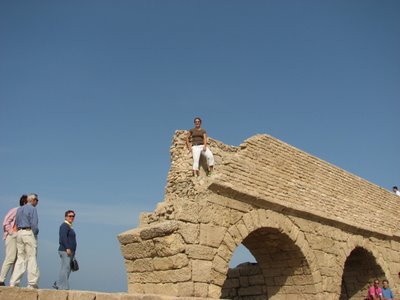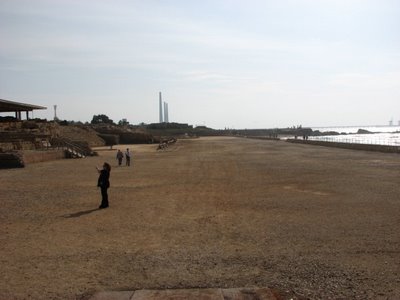Well, it’s a complex question, as usual. So, for this post I will only focus on one aspect of ‘the situation’, although this aspect could take chapters and chapters to explain.
In the South, very near the border with Gaza, a town called Sderot and its surrounding communities has been hit with rockets from northern Gaza every day. An Israeli woman was killed early last week, and in the same barrage, a young man who was one of Defense Minister Peretz’s bodyguards was severely wounded. They had to amputate both of his legs. This last week, another man was severely wounded. He later died from his wounds, just days before his son’s Bar Mitzvah, unless I am mistaken. The Defense Minister is from Sderot; his house is there. Still, rockets keep falling. Last week, in a twenty-four hour period, at least ten of these huge rockets fell on the town.
Every day, several times a day, the sirens sound and the residents hurry to bomb shelters or wherever they can find safety.
The most emotional stories I’ve heard are those of the kids. Many of them stay home from school because they’re too afraid to go outside. The ones who do go to school are so scared and stressed out they can’t even focus. The teachers say that they have to spend most of their time trying to get the kids to focus and calm down, and in the remaining time they try to teach them something and progress with the curriculum. When I was a kid, we did earthquake drills in which we all got under our desks and held on so that we wouldn’t fall out or something. These kids all run to the bomb shelters when the sirens sound.
Here is an excerpt from a Jerusalem Post article detailing a few aspects of the situation:
“We arrive at the first [nursery school] a little after 8:30 a.m. All the children are already sitting in their seats, thinking that at this very time Wednesday a few rockets fell so close to this place, and killed Yaakov Yaakobov (the man previously mentioned), who was buried Wednesday afternoon…[And] we speak with the teachers.
One of them, Debbie, details how they had just managed to go to their security room with 15 children aged 3-5, in 15 seconds. She describes how they walk quickly, in a way that has already become routine, stay quiet and wait to hear the explosion of the rocket. The children, she says, have already gotten used to this somehow.
Debbie mentions that the children have begun to take yoga classes, trying to ease the unnatural reality of not being able to play outside in the nursery school playground. No one is taking chances these days in Sderot.
When they go home, Debbie says she reminds the children not to go to any playground and to run home as fast as they can.
The children’s parents do not have private cars to pick up their kids, and we can see them trotting alongside their youngsters to get them home as fast as possible. It’s surreal to see the empty playground, built recently to improve the quality of life in Sderot. Debbie remarks that the last time the children were allowed in the playground was a month ago…
When we arrive at the next nursery school, Ofra the teacher is talking about snails, which turn up in the winter, and asks the children, ‘Why does the snail have a shell?’ The children answer in chorus: ‘So it can be protected from the Kassams’.”
Just imagine for a moment that one of your children or grandchildren goes to one of these schools. Imagine the utter terror and numbing fear these little people experience every day of their lives – the children at school, hearing sirens half a dozen times a day (these are not drills; they are actually attacks) and walking quickly to the shelters; the parents waiting and wondering if their children will be alive when they go to pick them up after school. Three year olds are showing symptoms of PSTD, and only half of them have been treated. Six year olds, who are the oldest to have never lived without the Kassams (the barrages started six years ago), travel outside of Sderot and notice immediately things six year olds should never have to think about – the security room isn’t big enough for the number of children assigned to it, the school isn’t properly protected, etc, etc. Still the rockets keep falling.
This weekend, a ceasefire was negotiated between Israel and the Palestinian militant groups, including Hamas and Fatah. Hamas officials promised that, if the IDF would withdraw from Northern Gaza, then the rocket attacks against Israel, including Sderot, would end. Saturday night, the IDF pulled out of Northern Gaza. The ceasefire went into effect at 6 a.m. Not thirty minutes later, the warning sirens went off in Sderot – rockets had been fired from Northern Gaza and were headed straight for the town. The ‘ceasefire’, which was a sham in the first place, in my humble opinion, was over before it began. It was a sham because the only purpose of Hamas’ existence, very clearly and unabashedly stated in their charter, which you can Google and read at your leisure, is the destruction of Israel. Why would such a group honestly and with good intention agree to a ceasefire with the very people they exist to exterminate? This is not rocket science, people.
To be fair to Hamas (ha!), the rockets were not fired by Hamas people, although God knows they have everything to do with the problem and nothing to do with the solution. Israel was the only partner in this two-entity deal who kept their end of the bargain flawlessly. Also note that those who are firing rockets are firing weapons intended to kill innocent people – children in preschools, women walking on the street, men doing their jobs. The idea is to kill as many people as possible. When the IDF sent men into Gaza, they did it with the sole intent of stopping these indiscriminant attacks on civilians, these acts of terrorism. In other words, they did it in self-defense. For, what country in the world lets these things happen to their children without acting out in self-defense? And who in their right mind would condemn such a country for trying to protect their children?
And yet the ‘ceasefire’ was broken, and the rockets keep falling.
This is all coming in the context of the post-Lebanon War mess. The war exposed a lot of weaknesses and corrupt behavior in the Israeli government, things that wouldn’t have made much of a difference without a war, but you know… Now 80% of Israelis think that the Defense Minister (yes, the one who lives in Sderot) should step down or be fired if he won’t. The President is being investigated on rape charges (or maybe he was acquitted, can’t remember), and the Prime Minister on something having to do with tax fraud.
And the country keeps on going, as it always has (unless the bus drivers strike or there’s a sudden gas shortage). Ulpan keeps on going, thank God, and the world keeps on spinning.




















